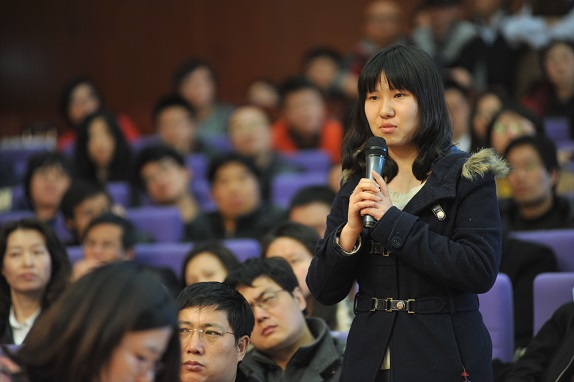No. 11 | Economic Outlook Pre-Eighteenth Party (CPC) Congress
On March 24, 2012 Tsinghua University Center for China in the World Economy (CCWE) held the eleventh Tsinghua University China and the World Economic Forum, entitled, “Economic Outlook Pre-Eighteenth Party (CPC) Congress.” The forum focused on the conditions of and outlook for both the Chinese and global economies and the many elements and issues that will influence China and the world. Major issues addressed included the future of the euro zone; the United States’ economic recovery; China’s real estate and stock markets; and future reforms to China’s financial markets and model for economic development. Professor David Daokui Li, Director of CCWE, served as the forum’s moderator.
Forum panelists included: WANG Jian, Secretary-General, China Society of Macroeconomics; WANG Gang, Deputy Secretary General, Committee of Decisional Counseling, Wenzhou, China; QIN Hong, Director, Center for Policy Research, Ministry of Housing-Rural Development of China; LIU Jipeng, Professor of China University of Political Science and Law; WU Bingbing, Professor of Middle East Studies, Beijing University; Francis LUI, Director, Department of Economics, HKUST; YUAN Gangming, Senior Research Fellow, CCWE and Chinese Academy of Social Sciences; Bart van Ark, Executive Vice President & Chief Economist, The Conference Board; and Jamil Anderlini, China Bureau Chief, Financial Times.

The discussion began with Mr. van Ark stating that overall, the world economy will grow at a slower rate in 2012, with growth picking up slightly in the U.S., but remaining flat in Europe and slowing in emerging markets. In regard to the euro zone crisis, he believes that the risk of Greece leaving the region or breaking up the zone is much less than before, since the situation seems contained at the moment. This assessment stood in contrast to that of Mr. Anderlini, who explained that the Financial Times is predicting that Greece will be kicked out of the euro zone and that Portugal and then possibly Italy and Spain will follow, and that there will be a breakup of the euro zone. In terms of the United States, one appraisal voiced optimism over continued improvement while another voiced concern over Americans’ reluctance to consume. Mr. Wu addressed the situation in the Middle East and offered the opinion that Iran will use the nuclear issue as a bargaining tool and that the situation ultimately will not lead to war. Moving on to domestic issues, there was much discussion regarding the real estate market, with the assertion made that the biggest threat to the economy remains the housing market. It was also stated that governmental work focusing only on the housing problem will not be effective, as reforms to increase consumption as well as improve the financial system are necessary to help stabilize the housing market. In terms of the Chinese stock market, it was predicted that 2012 would not be a good year, since the system is still not sufficiently advanced and regulation is still inadequate. Furthermore, the view was also voiced that the majority of China’s economy has to do with the global environment.
The forum also featured the release of the most recent economic report produced jointly by CCWE and HKUST Center for Economic Development. The report forecasts the economy for 2012, covering GDP, CPI, M2 supply, import and export and fixed asset investment. The report predicts that China will experience a GDP growth rate of 8.4% in 2012, a modest slowdown from the 9.2% growth experienced in 2011. CPI will decline to 3.04%, while M2 will grow by 13.8% in 2012. The growth rate of exports will decrease sharply to 10.2% in 2012, a much slower rate than in 2011, which saw a growth rate of nearly 20.3%. And the growth rate of imports will also decrease to 15.3%, down from 24.9% in 2011. In 2012, the trade surplus will decrease to 0.98% of GDP. Fixed asset investment will see its growth rate remain relatively high at 22.0% in 2012.
As a timely and effective platform, Tsinghua University will continue to invite extraordinary policy-makers, experts and business leaders -- domestic and international -- to address current and long-term Chinese domestic issues in relation to the international political and economic environment. The objective of the forum is to brainstorm/inform and provide a solid basis for policy debate and recommendations.




